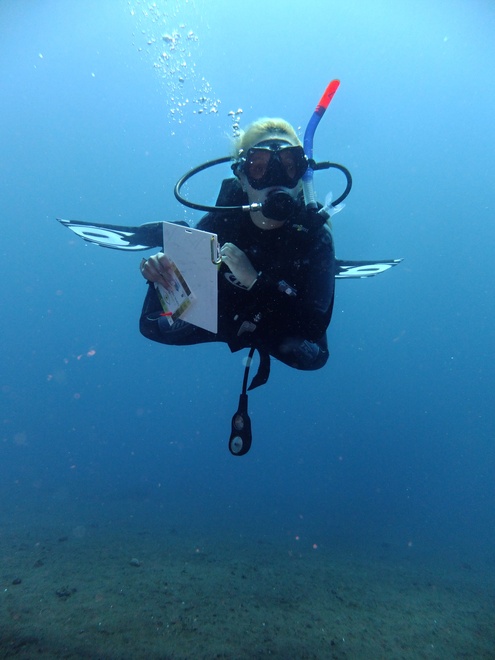by Guest Blogger Henley Spiers
This time around, I’m going to focus on selecting a dive shop for your course and all the variables you should consider.

Factors to consider when choosing a dive shop:
• Reputation: Awards and distinctions (for example, a 5* PADI career development center) are a good start here, but it’s important you delve deeper, too. See if any of your dive friends and their networks have experience with the dive shop you’re researching. Research what people are saying on sites like Tripadvisor and ask if the dive shop has any testimonials from previous divemaster trainees. While it’s an intangible, it’s important to find a dive center that makes you feel comfortable. The nationality of the people running a place often plays a big role in the style and sense of humor you’ll find in a dive shop, too, so it’s worth knowing that in advance.
• Teaching: Find out who will be responsible for teaching you on a day-to-day basis. Some dive centers have just one instructor responsible for divemaster training while others have you learn from multiple instructors. Both approaches can work well, but you’re looking for instructors who will inspire and push you to greater heights. Seek information on their credentials and get feedback from their prior students.
• Course length: Becoming a decent diver and a divemaster requires a lot of time spent in the water. Because of this, I fundamentally distrust any place that offers a divemaster course in two weeks or less. You may be able to get a rating by the end of this time period, but I very much doubt that you will have mastered the skills required for diving at a high level. Look for a course that’s at least one month long and offers the opportunity to build experience after certification, too. If you need to complete your Openwater, Advanced, EFR and Rescue courses as well, then factor in extra time.
• Big or small? Find out how many divemaster interns the dive shop typically has and the scale of their professional development. A smaller dive shop with fewer divemaster trainees should yield more one-on-one time with your instructors and allow you more experience with real guests. A dive shop with a larger group of divemaster trainees will give you a bigger peer group to hang out with but typically less experience working with real guests due to the increased competition. If you’re looking at doing your instructor course afterward – or any other additional training – then a bigger shop is more likely to provide that option. I suppose it comes down to your own personal preferences and whether you want to be a big fish in a small pond, or vice versa.
• Training organization: From what I’ve seen, the content of the divemaster (or equivalent) course is pretty closely aligned across various training organizations, so I wouldn’t worry too much about that. PADI is the biggest and most recognized training organization in the world and, generally speaking, provides the most employment opportunities. That being said, in some countries (France, for example) other training organizations such as CMAS and SSI dominate the market. If you have your heart set on either doing your training or finding a dive job in a specific region, then check in advance which training organization is the preferred one locally. In addition, each training organization has a clearly defined set of standards that a divemaster needs to meet with his or her training. Ensure that the dive shop you choose adheres to these standards. If they skip certain sections then it will be you who suffers in the end – particularly if you decide to pursue additional training and find yourself lacking certain skills, education and experience.
• What’s next?: This factor is often overlooked, but it’s important to find out what the dive shop can do for you after your divemaster course. Can you dive for free or at a discounted rate? What about discounts for your friends and family? If diving will be your new career, will there be any job opportunities for you at the dive shop? If not, can your training center help you find employment elsewhere?
• Cost and value for money: In an ideal world, you will find the perfect place for your divemaster course and one that fits your budget, too. That said, prices can vary a lot for divemaster internships and you may be left having to choose a destination or shop that was perhaps not your first choice. If you’re feeling the squeeze financially, consider inquiring about getting a discount on your course. After all, you have nothing to lose by asking. Competition is high between dive centers, so in many cases you may be able to secure a small discount or at least some free specialties tossed in along with your basic course. Additionally, ask about what extras the dive shop can offer – perhaps experience in marine conservation, fish identification or free diving. Experiences like these can really add value to your program. If it’s low season in the destination you’re looking to visit, you are all the more empowered to ask for a discount as dive centers will be keen to get customers through their doors. And if money is really tight, then you can find some dive centers and programs that offer free divemaster training in exchange for a few months of work.

Well, that’s it for now. If you carefully consider the above factors, I’m confident you’ll find a great divemaster course. If the options seem overwhelming, then rest assured that almost everyone has an absolute blast while doing their divemaster course and never regrets it. If you have any specific questions, please feel free to comment and I’ll do my best to help.

